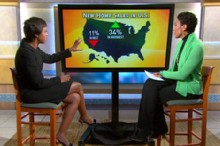WASHINGTON – Buying a home is about to get cheaper for a whole new crop of homebuyers — $6,500 cheaper.
First-time homebuyers have been getting tax credits of up to $8,000 since January as part of the economic stimulus package enacted earlier this year. But with the program scheduled to expire at the end of November, the Senate voted Wednesday to extend and expand the tax credit to include many buyers who already own homes. The House is scheduled to vote on the bill Thursday.
Buyers who have owned their current homes at least five years would be eligible for tax credits of up to $6,500. First-time homebuyers — or anyone who hasn’t owned a home in the last three years — would still get up to $8,000. To qualify, buyers in both groups have to sign a purchase agreement by April 30, 2010, and close by June 30.
“This is probably the last extension,” said Sen. Johnny Isakson, R-Ga., a former real estate executive who championed the credits.
The homebuyers tax credit is one of two tax breaks totaling more than $21 billion that the Senate included in a bill extending unemployment benefits for those without a job for more than a year. The other would let companies now losing money recoup taxes they paid on profits earned in the previous five years.
“We are still in a world of economic hurt, and Congress must continue to act boldly and creatively,” said Sen. Max Baucus, D-Mont., chairman of the Senate Finance Committee. “With the right mix of tax breaks and investments we will get through this recession and get folks working again.”
The real estate industry has been pushing to extend and expand the housing tax credit. About 1.4 million first-time homebuyers have qualified for the credit through August. The National Association of Realtors estimates that 350,000 of them would not have purchased their homes without the credit.
Extending and expanding the tax credit for homebuyers is projected to cost the government about $10.8 billion in lost taxes. While the measure passed the Senate by a 98-0 vote, Sen. Kit Bond, R-Mo., questioned its efficiency in stimulating home sales.
“For the vast majority of cases, the homebuyer tax credit amounted to a free gift since it did not affect their decision to purchase a home,” Bond said. “And for the small minority of buyers whose decision was directly caused by the credit, this raises the question of whether we are subsidizing buyers who may not have been able to afford buying a home in the first place.”
The credit is available for the purchase of principal homes costing $800,000 or less, meaning vacation homes are ineligible. The credit would be phased out for individuals with annual incomes above $125,000 and for joint filers with incomes above $225,000.
The credit would be extended an additional year, until June 30, 2011, for members of the military serving outside the United States for at least 90 days.
Expanding the tax credit for money-losing companies is projected to cost $10.4 billion.
The business tax break would allow money-losing companies to use current losses to offset taxable profits earned in the previous five years, giving them refunds of taxes paid in those years. Under current law, businesses with annual gross receipts of more than $15 million can claim losses back only two years.
The tax break would help industries suffering losses in 2008 or 2009, including retailers, homebuilders and newspapers. Congress included a scaled-back version of the tax break — for companies with revenues of $15 million or less — in the economic recovery package enacted in February. The new tax break would be available to companies of any size, providing a quick source of cash.
The U.S Chamber of Commerce has been a big backer of the tax break for money-losing companies.
“It frees up capital that they can use to maintain jobs and potentially even hire new people as the economy returns,” said Caroline Harris, senior tax counsel for the U.S. Chamber of Commerce.
The tax breaks would be paid for largely by delaying a tax break for multinational companies that pay foreign taxes. It was passed in 2004 and originally was to have taken effect this year, but would now be delayed until 2018.
___
The bill is H.R. 3548.
___
On the Net:
Congress: http://thomas.loc.gov



Pingback: mortgage broker richmond
Pingback: boating bc
Pingback: mortgage calculator
Pingback: payday loans
Pingback: krunker hack
Pingback: vancouver mortgage broker
Pingback: Melanie Bowen
Pingback: cna 2 classes
Pingback: tier2 junk
Pingback: he has a good point
Pingback: great post to read
Pingback: cheap car insurance
Pingback: alkaline water
Pingback: electricity
Pingback: water ionizer payment plan
Pingback: pay per day loan plans
Pingback: plan
Pingback: HD Coloring Pages
Pingback: website
Pingback: electricman 2 hs game
Pingback: house blue
Pingback: water ionizer loan
Pingback: plumbing slope calculator
Pingback: j b locksmith closter nj
Pingback: grade 6 electrical
Pingback: electricians tools pouch
Pingback: alkaline water brands
Pingback: pay per day loans plan
Pingback: water ionizers
Pingback: alkaline water machine
Pingback: laan penge nu uden renter
Pingback: stop parking
Pingback: stop parking
Pingback: 3gp mobile porn
Pingback: lan penge nu uden sikkerhed
Pingback: DIRECTV channels
Pingback: get satellite tv
Pingback: watch movies online
Pingback: Blue Coaster33
Pingback: greg
Pingback: Edward
Pingback: darryl
Pingback: Vincent
Pingback: Wade
Pingback: arthur
Pingback: edwin
Pingback: oliver